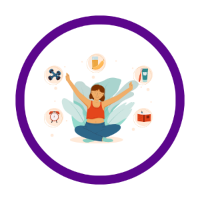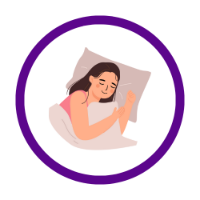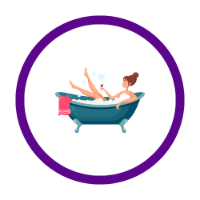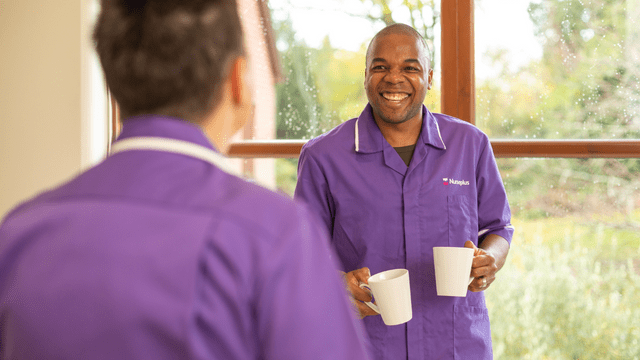Managing Stress in a Care Setting on National Stress Awareness Day
On National Stress Awareness Day, Nurseplus wanted to take a look at how we can reduce caregiver stress in the workplace and help those who work in care by providing tips on managing stress in a care setting.
There is significant evidence to suggest that people working in the health and social care sector have difficulty managing stress and are therefore more susceptible to stress-related illnesses. The physical and emotional side-effects that care workers can experience are often the result of:
increased workloads
problems accessing resources
being exposed to serious illness
witnessing traumatic situations
For a busy healthcare assistant, nurse, or support worker, it's not always easy to prioritise self-care. In fact, having the ability to deal with the stresses and strains common in care settings has become a necessity for healthcare professionals today, as the work they love becomes increasingly demanding.
At Nurseplus, we want to do all we can to reduce carer stress by offering constant support and advice from our teams in local branches, as well as access to resources and tips that can help manage stress levels both in and outside of work environments.
Managing Stress in Care Settings
To help our care staff maintain their resilience, and remain positive in the face of stressful situations we’ve put together some handy tips and suggestions that should make managing stress easier.
Mindfulness: Practicing being present in the moments that matter can help you excel in problem solving, adaptive thinking and improve overall job performance.

Mindful practices in the workplace: Take and enjoy your breaks. Breaks are there to give you time to reset and rejuvenate. Do just that by enjoying a cuppa, having a snack, or taking some time to go for a walk or catch up with colleagues.
Compartmentalise: Imagine your brain is an email inbox. You can’t manage what you get sent but you can choose what to work on and when.
Compartmentalising practices in the workplace: Only focus on what you can control in the moment. Apply extreme focus to one job at a time and take baby steps toward the next task until it's completed or your priorities are clear.
Detach: Caring is your job so it’s important to detach from each care situation before proceeding to the next, this way everyone receives the best of your care every time.

Detachment practices in the workplace: This is a tough one as it’s your job and passion to care, but part of that job is being able to give all those in your care your best. A top tip is to allow yourself a few moments between tasks to process the last before moving on to the next. This way you‘ll be fully present for every task throughout your day.
Takeaway tip: this can also be applied in your home and personal lives. Try practicing detachment on your commute to and from work, so you are present when you arrive at either.
Decentre: Managing emotions and reactions in care is essential. This means being able to step back from a stressful or challenging situation and act accordingly.
Decentering practices in the workplace: When you find yourself in a difficult situation, imagine looking down on yourself and taking a moment to ask yourself how modifying your actions and emotions might impact the outcome.
Compassion: This is a skill that will go a long way for those working in care, and is generally found in people who practice stress awareness.

Compassionate practices in the workplace: For those working in care, compassion often comes naturally. Things such as speaking kindly to those we work with and care for, celebrating the success of a colleague or client, offering encouragement, or simply listening can all help produce positive emotions and increase cooperation and collaboration.
These individual and easy-to-apply practices will go a long way to helping avoid staff burnout due to carer stress. You can share these practices with the people you work with to help spread stress awareness and promote better stress management in care.
Managing Stress with Seven Simple Self-Care Practices
As the Health and Social Care sector continues to experience pressures and challenges, we’d like to highlight the importance of managing stress levels in our care staff and encourage self-care practices. Here are seven self-care suggestions to help our carers unwind after work and recharge ready for another day of providing exceptional care.
..Self Care Practices | |
Get a routine: knowing what’s ahead each day will help manage any stress that might come from the unexpected. Forward planning can also alleviate anxiety which is prevalent among healthcare workers. |  |
Get a good sleep: simple but so important, a good sleep can set anyone up for a great day and give your body and mind the chance to reboot from the challenges of the previous day. |  |
Get outside more: believe it or not, the healing power of nature is unbeaten when it comes to managing stress. A study from Harvard Medical School showed that cortisol levels (the stress hormone) dropped in those who took part after spending just 20-30 minutes in nature per week. |  |
Get an interest in exercise: this doesn’t mean going to the gym but simply finding a form of exercise you can do consistently. Exercise can help improve your mood, lower stress, and help you sleep better. |  |
Get a support system: your colleagues and loved ones can usually be relied upon to unload all your work-related woes upon, but sometimes, having an outsider to talk to can help. Consider joining an online community, local group, or reach out to your local Nurseplus branch team. |  |
Get a good meal plan: better food makes you feel better; Fact! Try and look forward to your meals, make them nutritious by adding colour, make them filling by adding balance with proteins and veggies, and make them something you enjoy. |  |
Get a treat for yourself: doing what makes you happy can instantly boost your mood. This can be anything from taking a walk, meeting with friends, having a long relaxing bath, enjoying a sweet treat, or investing time in a hobby. Whatever it is, do it for you. |  |
At Nurseplus, our people are what make us, so it’s our mission to make sure these people are physically and mentally able to do the job they love. We hope that our stress awareness advice will help reduce carer stress within our care settings and that others will share this advice in honour of National Stress Awareness Day 2023.
Remember, you can always speak with your local branch if you are feeling overwhelmed or stressed at work. Our staff are always happy to help in any way they can and we have access to trained mental health first aiders who are on hand to provide advice support and guidance to those who need it. We also work closely with The Care Workers' Charityto support carers who may find themselves dealing with a stressful situation.
Posted on October 30, 2023 by Nurseplus

